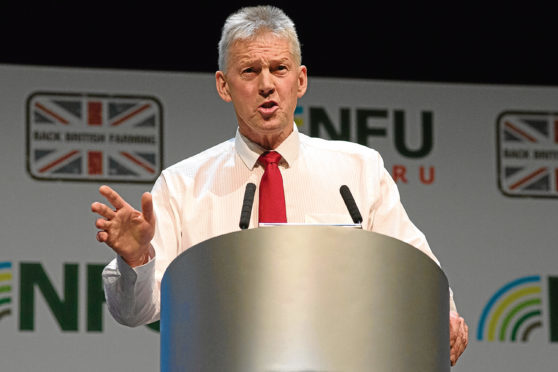Leaving the recent NFU Scotland (NFUS) conference I could not help thinking that Scottish farming appears like a rabbit caught in the headlights as it flails around trying to find a response to the threat of climate change.
Farming delegates were rightly angry at headlines blaming livestock production for destroying the planet – angry at the lack of balance and context in media reporting of the story.
They cheered when the Less Favoured Areas chairman stated he did not believe in climate change.
Unfortunately the president, whether intentionally or not, appeared to go even further by claiming it was a hoax.
The resulting BBC headlines made pretty grim reading for an industry that has the begging bowl out asking Scottish tax payers for £0.5 billion a year of their hard earned taxes in a post-Brexit world.
What on earth was the NFUS leadership thinking?
Yes, they should be fighting against media imbalance and demanding context and balance in the debate.
But to deny there is a problem is not credible and it risks losing support from a public who are deeply concerned about climate change.
The uncomfortable fact is we have a tough Scottish target of reaching zero carbon by 2045. The livestock sector dominates Scottish farm output and therefore agricultural emissions as a percentage of total Scottish emissions at 23% are much higher than the UK figure.
Scottish farm leaders need to acknowledge that fact and start explaining how the industry will cut emissions if they want to keep the public on side.
To be fair the union has set up the Farming for 1.5 Degrees committee, chaired by former president Nigel Miller and Mike Robinson of the Royal Geographic Society, who gave an excellent presentation at the conference.
Mike’s message was blunt –climate change was real and carbon zero was going to happen. Agriculture had to deliver its share of emissions reduction.
He warned there was no silver bullet either by changing the accounting method on carbon sequestration or on methane emissions. It could help at the margins but farmers would still need to cut emissions.
He also warned that as the world moves to a low carbon future, markets would demand sustainable production.
It therefore seems to me that the Scotch Beef label could be fatally damaged if the industry cannot move to a zero carbon future.
Our failure to act means we are being left behind by our competitors.
The Irish are already well advanced in implementing a carbon reduction plan and the Australian beef industry has pledged to be carbon neutral by 2030.
Scotland’s farmers are also being let down by a lack of political leadership from the Scottish Government.
Nearly a year ago Nicola Sturgeon declared a climate emergency and claimed Scotland would lead by example.
Yet her farm minister Fergus Ewing’s response to the emergency is to wait five years before introducing new farm policies to help farmers tackle the problem.
Given the scale of the challenge that lack of action is inexcusable.
If the minister is short of ideas he just has to look across the water at the Irish climate plan.
So what’s going on?
Perhaps as one of my sceptical Aberdeen farmer friends observed: “It is no coincidence but 2024 takes us beyond the date of the SNP’s dream of another referendum.”
- George Lyon is a former MEP. He is a senior consultant for Hume Brophy, and sits on the board of levy body AHDB.
